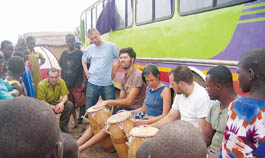home | metro santa cruz index | music & nightlife | band review

Conga Line: Members of Aphrodesia take a break from the bus on a 2006 trip through West Africa.
Continental Drift
San Francisco's Aphrodesia reinterprets the music that Fela Kuti made famous
By Andrew Gilbert
For Aphrodesia, the moment of truth came when the San Francisco band took the stage at the New Shrine, the legendary Lagos club founded by Nigeria's late musical rebel-in-chief Fela Anikulapo Kuti. The gig was the culmination of a month-long trip to West Africa, and the 11-piece combo's performance marked the first time a Western band had brought Fela's funk-driven Afrobeat style back to the source. Part of an international Afrobeat movement that has flourished since Fela's death from AIDS a decade ago, Aphrodesia had arrived in Ghana in February 2006 with the vague hope of traveling to Nigeria when a chance encounter put the band in touch with Fela's son, bandleader, saxophonist and Afrobeat standard-bearer Femi Kuti. Against all odds, the band made it to the Shrine and put on the show of a lifetime. (A detailed account of the harrowing trip from Ghana to Nigeria can be found at www.aphrodesia.org.)
"We were all exhausted from trying to cross the border all day, dealing with armed soldiers in our face, snatching our passports and looking for bribes," says bassist Ezra Gale.
"We're looking out at this crowd of 400 Nigerians standing there with their arms folded, looking back at us like, 'OK, white people, let's see what you got,'" Gale says. "Three or four songs into our set, Femi came out and played with us, and that was the stamp of approval. Once that happened, everyone was up and dancing."
Founded by Gale and vocalist Lara Maykovich in 2003, Aphrodesia has honed its own particular take on the Afrobeat sound by incorporating a myriad of instruments, such as the Shona thumb piano known as the m'bira, which Maykovich studied while living in Zimbabwe.
Much like Brooklyn's Antibalas Afrobeat Orchestra, widely considered the seminal post-Fela Afrobeat band in America, Aphrodesia also draws on Afro-Caribbean, reggae and hip-hop grooves. But it's Fela's horn-laden sound, a powerful synthesis of Nigerian polyrhythms and American funk and jazz, that forms the bedrock of Aphrodesia's sound, just as his outspoken politics mesh with the band's sense of mission.
Born to an elite Yoruba family, Fela was strongly influenced by his mother, Faunmilayo, a leader in Nigeria's anti-colonial struggle. He was already an accomplished high life musician when he experienced a double epiphany in the late 1960s while spending time in Los Angeles. A James Brown concert transformed him into a funkaholic, and an affair with Black Panther party member Sandra Isidore introduced him to radical black-power politics.
Returning to Nigeria just as the country was emerging from a brutal three-year civil war, Fela and his band Africa 70 quickly gained a huge following in Lagos with searing performances that challenged a succession of military dictatorships. By 1974 he and his band Africa 70 had become a blur of activity, releasing 17 albums within three years, including classics such as Zombie and Coffin for Head of State.
Fela and his entourage settled into a compound he called Kalakuta Republic, which was burned to the ground by the government in 1977 in retaliation for his scathing denunciations of corruption. As a form of political protest against the government's harassment, Fela simultaneously married 27 women, many of them band members. Frequently arrested and beaten by the police, Fela survived because the government seemed to sense that killing him would only increase the power of his indictment.
"He was immensely complex and conflicted and contradictory," says Trevor Schoonmaker, editor of Fela: From West Africa to West Broadway (Palgrave Macmillan Press). "He was both a radical visionary and utterly conservative, trying to adhere to traditional practices. When he married 27 women, it was a traditional Yoruba ceremony, but he wasn't unifying 27 families. He was taking 27 brides because 'I'm Fela and I'm a rock star.'"
Fela's fearless commitment to social action remains a key part of his legacy, a bequest that many Afrobeat bands have embraced. Aphrodesia first gained widespread attention in 2004's Just Vote Tour, a cross-country voter registration drive in a vegetable oil–powered bus (members are driving the fourth incarnation of that petroleum-free vehicle to Santa Cruz). While one can simply enjoy the relentless grooves, Aphrodesia's songs often reflect the band's progressive agenda, whether denouncing the Iraq war or championing environmental causes.
"We never sat down and said, 'OK, we need to be a political band,'" Gale says. "It flows out of who we are as people and how the music speaks to us. Which isn't to say you couldn't write a silly Afrobeat pop song. I'm sure you could, and I reserve the right to do that. But so far, the grooves and the politics really lend themselves to each other."
APHRODESIA plays Friday, Aug. 17, at 9:30pm at Moe's Alley, 1535 Commercial Way, Santa Cruz. Tickets are $12 adv/$14 door (831.479.1856).
Send a letter to the editor about this story.
|
|
|
|
|
|